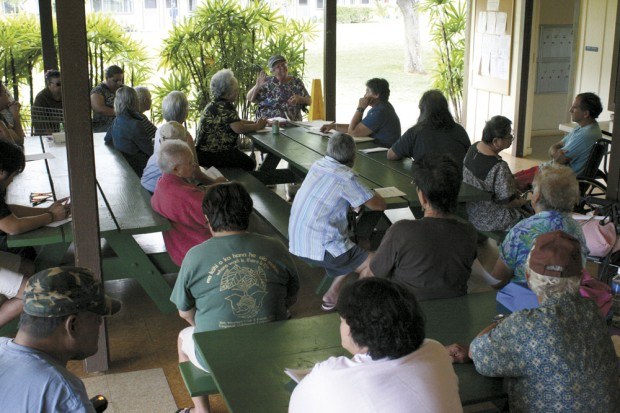LIHU‘E — Residents of a secluded condominium complex in Lihu‘e, where roughly 57 senior citizens living on a fixed low-income go through a lengthy process to secure a lease, are saying a green initiative will result in higher rent because they will lose their federal utility allowance.
Lihu‘e Elderly Gardens resident Judy Xenofos said that when a photovoltaic system was recently installed on the property, residents thought they would be benefiting from it through lower utility bills. But, as it turns out, the condominium’s management plans to pick up the electric bill and sell its excess electricity to the island’s utility provider, causing residents to lose their monthly $73 electricity allowance provided by the federal Housing and Urban Development agency.
“Who is going to cut their pills in half?” Xenofos said. “Who is not going to buy meat this week?”
Xenofos, along with roughly half of Lihu‘e Elderly Gardens residents, got together Friday at the condominium’s common area to discuss the consequences of an agreement between HUD and Mark Development, the condominium’s management company.
Mark Development president Craig Watase sent a memo Tuesday to residents, informing them of an eminent agreement with HUD and the outcome.
“Everyday PV users can feel good about reducing Hawai‘i’s dependence on imported oil and reducing the carbon emissions associated with it,” Watase said in the memo.
However, not one of the residents at the Friday meeting seemed to “feel good” about losing the monthly $73 across-the-board electric bill allowance from HUD.
The HUD utility allowance means that each resident who exceeds $73 in electricity usage has to pay the difference out of pocket. In practice, to many residents, losing the allowance will mean paying $73 more for rent.
For Watase, it could mean more comfort for the residents, as he said in the memo that the management company knows that many residents limit their use of cooling and cooking appliances to reduce their electric bill.
“As your landlord, I want all of you to be able to use as much electricity as you need to be comfortable — but not wasteful,” he said in the memo.
Xenofos said all of the residents must have “low-income” to qualify for a lease. But some of the residents are “very low income,” and qualify for even more utility benefits that could lower their rent an additional $490 annually. The HUD-Mark Development agreement would cause those “very low-income” residents to lose that benefit, she said.
Confirmation
Elderly Gardens resident Donna Raicevic sent an email Wednesday to Watase, asking if her rent would be raised after the agreement.
Watase responded Friday, confirming that HUD had approved transferring the bill to the management company.
“The rent remains the same, however you will not get a utility allowance anymore (normally deducted from rent),” he said in the email. “So the amount that you will pay to us will be higher by the amount of the utility allowance.”
He also told Raicevic that from now on it will be “real simple.” There won’t be a utility allowance or an electric bill anymore.
“Run your fan all day if you need to, and don’t worry about the cost, OK?” he said in the email.
Xenofos said a lot of residents are afraid of retaliation from the management if they sign a petition against the agreement. But she also said that together, the residents have power and at least they will know they “did not sit down like sheep.”
Some of the residents raised concerns about the way resident manager Junar Bisarra goes about with his business. They said they feel Bisarra treats them with disrespect and does not give credit to their concerns. They said Bisarra told them on various occasions that if they are not happy with the condominium, they can move out.
One of the residents said she had to call the police last year after feeling threatened by Bisarra.
Bisarra declined an opportunity to comment on residents’ claims Friday.
Other concerns
Other concerns involved some Americans with Disabilities Act improvements that they say need to done.
Many of the residents who are in wheel chairs would benefit from double doors rather than single doors, said resident Nataan Kauakahi. Some residents also mentioned a request from a woman with physical disabilities who needed a refrigerator that accommodates her physical challenges, but her request was denied.
Many residents at the meeting were also worried about the smart meters installation that KIUC has already begun at the complex.
Bisarra on Tuesday told The Garden Island over the phone that KIUC notified him the smart meters would be installed but declined to comment on whether he notified the residents. At Friday’s meeting residents, were blaming KIUC for the lack of notification, unaware that Bisarra knew of the installation.
Kauakahi was concerned that about eight meters servicing his entire building would be installed just outside his unit, which has thin walls, he said.
Watase said in the Wednesday memo that preventing installations of smart meters is a violation of the lease, which in paragraph 14f states:
“Landlord may from time to time make alterations, additions and repair in an about the unit and the premises. These alterations shall be paid for by the landlord. You agree to allow landlord and any of its agents or contractors to enter the unit during reasonable hours for such purposes.”
Smart meters project costs total $11 million, according to the co-op. Half will be covered by federal grants. The co-op is funded by its members, but is not billing each member individually for smart meter installation.
• Léo Azambuja, staff writer, can be reached at 245-3681 (ext. 252) or lazambuja@ thegardenisland.com.





